Josip Heit linked hydroelectric project triggers criminal complaint
![]() Approval of a hydroelectric power plant in Croatia has caused alarm over environmental concerns.
Approval of a hydroelectric power plant in Croatia has caused alarm over environmental concerns.
The fallout has gotten so bad criminal charges have now been filed against the government official who approved the construction permit.
The companies at the center of the scandal are Pipra and a contractor going by Starac.
Starac is owned by Josip Heit, who BehindMLM is familiar with through ownership of GSB Gold Standard Banking Corporation and related MLM crypto fraud.
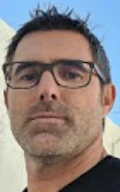 On his personal website, Heit cites Starac GmbH and Starac d.o.o. as his “first companies”. Starac is reported to be managed by Sasa Svalina (right).
On his personal website, Heit cites Starac GmbH and Starac d.o.o. as his “first companies”. Starac is reported to be managed by Sasa Svalina (right).
Citing “unverified information”, Forbes Croatia reports;
Heit is not only Svalina’s business partner, but also his brother-in-law.
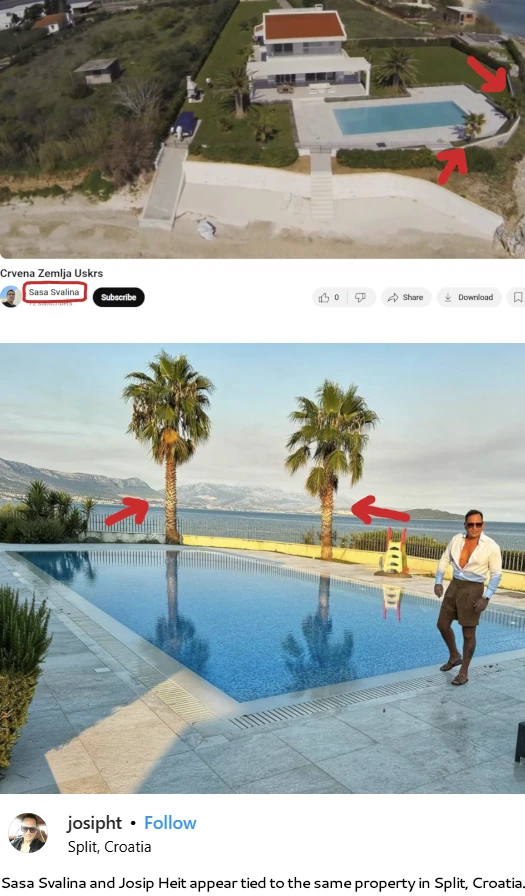
Forbes Croatia also claims Svalina manages White Rock as its Director.
 Josip Heit (right) claims ownership of White Rock Ltd and White Rock Minerals Ltd, through parent company GSB Gold Standard Corporate AG.
Josip Heit (right) claims ownership of White Rock Ltd and White Rock Minerals Ltd, through parent company GSB Gold Standard Corporate AG.
Pipra is the primary investor in the proposed hydroelectric plant, planned to be built at the source of the Una river in Zadar, Croatia.
Pipra is owned by Svalina and Pierre Vice Milutin.
As reported by Forbes Croatia on August 9th, not far from the proposed hydroelectric plant site is the Una spring.
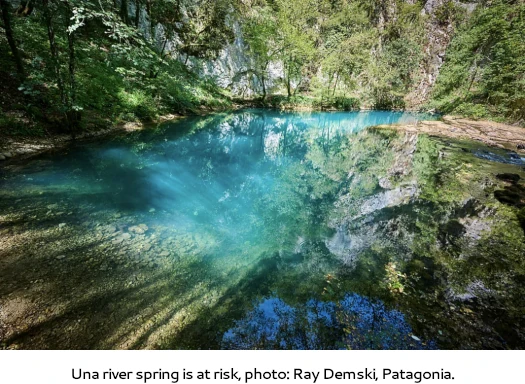
Una Spring is “hydrological nature monument” that has been protected under Croatian law since 1968. The site is also protected under the European Natura 2000 initiative.
The Croatian public has been outspoken in protest against the hydroelectric project, the construction of which they claim will “devastate” the surrounding environment.
Local NGOs cite construction of the hydroelectric project is a “crime on nature“.
Protesters are blocking the construction of a small hydroelectric plant in Croatia that they say threatens one of the Balkans’ most unique and sacred rivers.
The source of the Una River is one of the deepest karstic springs – where water flows up from conduits in the bedrock – on Earth. Running from Croatia into Bosnia and serving as a natural border, it carries major cultural significance and represents the shared heritage between the two countries.
The river is also home to 17 threatened species, and campaigners say the construction work puts this protected waterway at risk of serious environmental damage downstream.
Following ongoing onsite protests, on Thursday August 8th
the State Inspectorate reported … it [has] filed a criminal complaint against the official who issued the location permit for the construction of a small hydroelectric power plant due to suspicion of abuse of position and authority.
Croatia’s Ministry of Environmental Protection and Green Transition has also
asked the Institute for Environmental and Nature Protection to determine whether the construction of a small hydroelectric power plant caused a harmful effect on nature.
While that sounds promising with respect to preservation of Una and its spring, Forbes Croatia writes;
It is possible there will be [a] determination of responsibility and sanctions [against] those responsible. Or a cover-up, as the protesters fear.
People’s Dispatch additionally reported on August 14th;
On Monday, activists met with regional officials seeking concrete reassurances, but according to Božica Keča, a resident of Donja Suvaja where the protests are centered, no solid commitments were made.
Speaking at the Zadar protest, Keča expressed frustration: “We will protest until we receive confirmation that the works have been completely stopped.
No one consulted us, those who live here and cherish the natural beauty. We want to see the excavators leave, and we only accept actions that restore the area to its original state.”
The damage already done may be irreversible. “Cultural monuments, such as water mills, have been destroyed, and stones removed and discarded. They can only try to patch up the devastation,” Keča added.
Whether Starac was involved in the destruction of the cited mill is unclear.
A followup August 18th article from Forbes Croatia explores Josip Heit’s ties to the hydroelectric project.
The business partner of the investor in the hydroelectric plant at Uni is Josip Heit.
The entrepreneur and millionaire is completely unknown to the Croatian public, and in Romania he is a tabloid star and the owner of probably the most expensive car in the country.
It is mentioned more and more often in the context of numerous pyramid schemes that it has been organizing for years.
In Croatia, [Heit] is completely unknown to the public, considering that he spends most of his time in Germany, the United Arab Emirates and Romania.
In Romania, he is a tabloid star because of his wealth, but there are also articles about him in the media investigating fraud. He is mentioned in the context of Ponzi schemes and closeness to mafias.
Among other things, Forbes notes Heit’s “significant” involvement in Karatbars.
Karatbars International was a fake gold ruse pyramid scheme turned MLM crypto Ponzi.
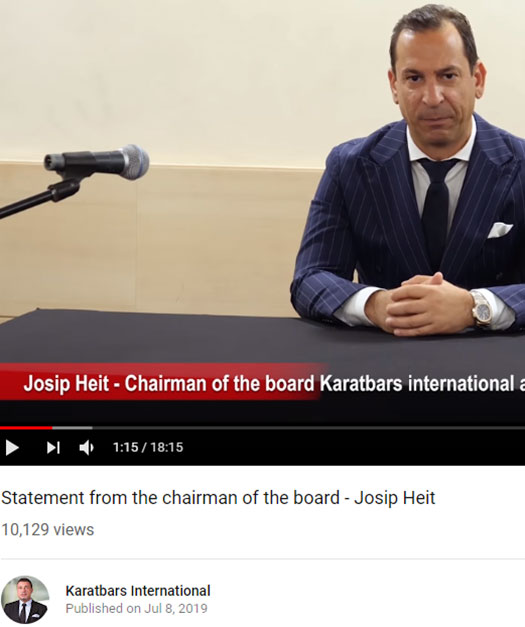
Sasa Svalina’s role within Karatbars is unclear but he did appear in at least one marketing video:
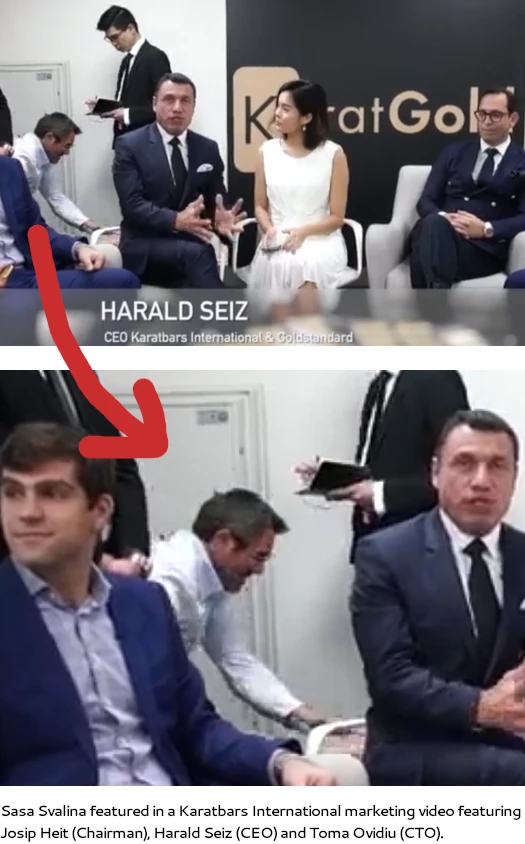
Suspect gold is a recurring theme in Heit’s business ventures.
Gold was central in the first ruse of Heit’s Karatbars spinoff, GSPartners.
The system combines the scarcity of gold with the spendable nature of cash.
GSPartners collapsed last December following over a dozen fraud warnings and fines from regulators around the world. The latest jurisdiction to take action was the Bahamas earlier this month.
Forbes Croatia notes Sasa Svalina is also the Director of Grupa Toranj.
The owner of that company is the American company S&G Brothers, which, according to information from the Internet, is engaged in trading precious metals and precious stones.
The director of that American company is also Svalina, and considering his name (Saša Svalina has a brother Gordon, and the company is called S&G Brothers, OP.FH.), it can be assumed that he is also the owner or co-owner.
The official website of the American company reveals that Svalina is engaged in the sale of gold bars and diamonds from Venezuela and Brazil.
An interesting detail is that there is no bullion price on the page, as would be usual, but only information on how they offer gold bullion under “very interesting conditions”.
The already mentioned Toranj Group has no employees and no income, but it has EUR 4.78 million in assets.
Gold was also the initial ruse of Auratus Gold, an unofficial GSPartners now primarily targeting Australians.
Auratus Gold dropped its TAS Vault investment scheme following a fraud warning from the Texas State Securities Board earlier this year. Now the scheme illegally solicits investment through “Zai Card” and “gold points”.
In addition to state-level action, BehindMLM has previously reported on ongoing US federal investigations into Heit’s business activities.
If the Croatian government is serious about investigating potential corruption surrounding the Una river hydroelectric project, perhaps those investigations are worth looking into.
Update 17th October 2025 – Imperijal, an independent Croatian publication, has published an update to Josip Heit’s troubles in Croatia.
Although Josip Heit is still living his golden dream on Instagram , not everything is so rosy in his paradise. He has also been hit by foreclosures in Croatia.
Namely, right next to the top villa registered to his brother-in-law Saša Svalina , the husband of his sister Mladenka, on Crvena zemlja Street, right by the sea in Kaštel Štafilić, two foreclosures have been registered.
The title deed of Heit’s outbuilding located next to his house also states that it is illegal.
We also found Josip Heit’s name on the black list of tax debtors. There it is visible that he owes real estate transfer tax in the amount of 43,510.78 euros.
Apparently, it was because of this tax debt that the Republic of Croatia imposed a foreclosure on his seaside villa in Kaštel Štafilić.
The “seaside villa” is believed to be the Split, Croatia property in the screenshots linking Sasa Svalina to Heit cited in this article.


Why is Josip Heit not being arrested and made to face up to his crimes and made to have his assets seized to pay those you lost in GSPartners?
Jean, the issue is that JH lives in Dubai and only visits countries that do not have an extradition treaty with the US or won’t extradite their own citizens.
He seems to be aware of an arrest warrant or is guessing that there is.
Who is that playing with fake gold in the background… ibb.co/4gy8mjq
Oh hey. Nice catch!
It is amazing how greed combined with fraudulent criminals will destroy so many victims and their friends and families.
So looks like Heit’s and Svalina’s Split house in Croatia doesn’t have required building permits;
Also there might be a coverup as to why building of Heit’s hydropower project was halted;
forbes.n1info.hr/aktualno/zasto-je-rjesenje-o-obustavljanju-gradnje-hidroelektrane-na-uni-tajno/
Article updated with Croatian publication update on Josip Heit’s troubles in Croatia.